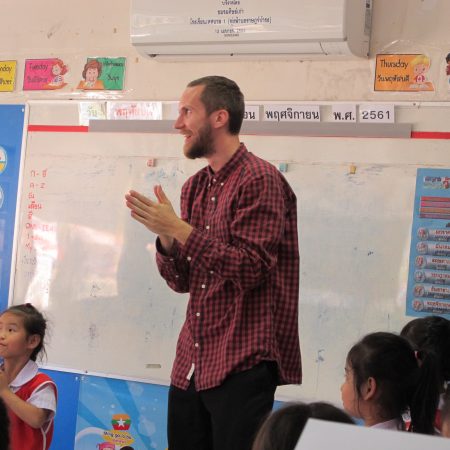
TEFL stands for Teaching English as a Foreign Language. CMUTEFL is a comprehensive 120-hour program designed to equip trainees with the essential skills to teach students of all ages. Trainees will have the opportunity to instruct mixed classes comprising both undergraduate students from Chiang Mai University and non-CMU students.
On the other hand, CELTA stands for Certificate in English Language Teaching to Adults. The curriculum and syllabus for CELTA have been developed by the University of Cambridge. This training course is specifically designed to focus on teaching adults in a language school environment.
CMUTEFL has received approval from the Board of the Language Institute, Chiang Mai University. The Board comprises various academics from both Chiang Mai University and Chulalongkorn University, with the current chairman serving as a Vice President at Chiang Mai University. The syllabus and curriculum of CMUTEFL have undergone rigorous scrutiny and have been officially sanctioned by the Language Institute, Chiang Mai University. It holds the distinction of being the sole 4-week university-accredited TEFL training course available in Chiang Mai, and notably, the only course conducted on a university campus. Upon successful completion of the program, trainees will receive certificates bearing the signature and authorization of the Vice President for International Relations, Chiang Mai University.
Embark on a journey of assurance as CMUTEFL delivers a certificate accredited by the esteemed Chiang Mai University. As the exclusive 4-week university-accredited TEFL certification program in Chiang Mai, Thailand, prospective trainees can rest assured that the course they undertake is not only widely recognized but also embraced by prospective employers worldwide. Chiang Mai University, a beacon in the community and a reputable institution of higher education, not only in Thailand but within the global education community, sets the stage for your promising teaching career.
The CMUTEFL program is meticulously crafted to be both practical and hands-on. Our tailored micro-teaching sessions are designed for the swift development of trainees' confidence and the improvement of their classroom techniques. CMUTEFL places a strong emphasis on the application of methodology and pedagogy during teaching practice sessions, ensuring that the knowledge gained is not just theoretical but readily applicable in real-world classrooms.
Ranked 3rd in the overall university ranking, CMUTEFL guarantees the highest quality of instruction. Nestled at the heart of its main campus, below the foothills of Doi Suthep, Chiang Mai University offers the ideal environment for teacher training. The self-contained campus provides everything with a trainee needs, including restaurants, cafes, libraries, a fitness centre, an athletics track, tennis courts, and more. The teacher training facility at Chiang Mai University is unparalleled, featuring air-conditioned classrooms, multimedia labs, and a self-access learning resources centre filled with textbooks and resources for lesson planning. In essence, trainees are promised a holistic academic learning experience seamlessly integrated with the rich tapestry of Thai culture. Elevate your teaching career with CMUTEFL, where excellence meets opportunity.
With a network of over 225 active Memorandums of Understanding with international universities, Chiang Mai University has ascended to be one of Asia's most esteemed institutions. A qualification from Chiang Mai University holds weight and prestige, acknowledged not only by employers in Thailand but also resonating across the globe. Our graduates have successfully navigated diverse teaching landscapes, currently making impactful contributions in Vietnam, South Korea, Australia, Taiwan, China, Japan, South America, and various parts of Europe. Join our global community of accomplished educators and unlock boundless opportunities with a Chiang Mai University qualification.
We're here to help our grad students find teaching jobs in northern Thailand. They can apply for jobs on their own, but it's important to know we can't promise a job for CMUTEFL graduates.
To give our grads a better shot at landing a teaching gig, Language Institute Chiang Mai University fully supports job placement. After the course, we'll cover how to write a resume (CV), job hunting, and interviews. Plus, our trainers are available for one-on-one job help if needed. We also share tips on finding jobs in Thailand and help create a good CV. Usually, teaching jobs in Thailand ask for a bachelor's degree, a teaching certificate, and sometimes a demo class.
While a degree is not a prerequisite for entry into CMUTEFL, it's important to note that the government of Thailand mandates a college degree for all foreigners applying for a work permit. Many schools in Thailand typically require teachers to possess a college degree as well. It's advisable to check with your local Thai embassy or consulate for detailed information on work permit regulations and requirements.
We strongly advise against working during the CMUTEFL course due to its intensive and demanding nature. The course operates from Monday through Friday, engaging students for approximately 8 hours each day. Beyond class hours, students are expected to dedicate time to reading assignments and lesson planning. CMUTEFL is designed to be akin to a full-time job, and the commitment required may make simultaneous employment challenging. It's recommended that students focus their energy and attention on completing the program to maximize the learning experience.
No, all input sessions in CMUTEFL will be conducted in English by native English speakers. Additionally, all practice teaching will be exclusively in English. Developing techniques for communicating meaning using only the learners' L2 (English) serves as valuable preparation for trainees interested in teaching in other foreign countries. This emphasis on an immersive English environment ensures a comprehensive and globally applicable learning experience.
Yes, the culture of Thailand, and by extension, the dress code at LICMU, is notably conservative. As a reflection of this cultural norm, all trainees are required to dress as if they are teaching. For men, this entails wearing long trousers and a collared shirt, while women are expected to wear a blouse with a skirt or smart trousers. Attire such as jeans, sandals, trainers, and shorts is considered inappropriate and is not acceptable. Adhering to these dress code guidelines demonstrates respect for the local culture and aligns with professional teaching standards at LICMU.
We enthusiastically welcome applications from non-native speakers who possess a strong command of the English language. The assessment of this proficiency will be conducted through a personal interview with one of our trainers. We value diversity in our program and recognize the significance of a robust English language foundation for successful participation in CMUTEFL.
CMUTEFL is designed for a minimum of 2 trainees and a maximum of 12.
Trainees will engage in teaching both within LICMU and at predetermined schools in the broader Chiang Mai community. Practice teaching classes are intentionally limited to a manageable size, typically with no more than 20 students. Trainees will receive information about the lesson level well in advance.
Throughout the course, our program incorporates 9 Observed Teaching Practices, including 3 university-level classes, 2 kindergarten-level classes, 2 high school-level classes, and 2 online classes. It's essential to highlight that the months of March, April, and October are ideal for TEFL training, aligning with the conclusion of courses before the new academic semesters, when schools actively hire for upcoming terms.



